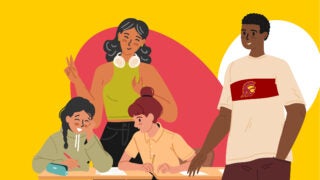Lora King, 32 years after her father’s beating by police: ‘We should not still be here’
The daughter of Rodney King speaks out during launch of the USC Annenberg Charlotta Bass Journalism & Justice Lab’s Voices of a Movement series.
When Rodney King was nearly beaten to death by Los Angeles Police Department officers on March 3, 1991, his daughter Lora was just 8 years old. She describes being “terrified” when she went to visit her father in the hospital days later. She didn’t recognize his face and could not be convinced it was her dad lying there until she heard his voice.
“As a kid, I couldn’t understand,” King said Tuesday during a lunchtime conversation that served as the public launch of the USC Annenberg Charlotta Bass Journalism & Justice Lab. “I didn’t understand why people didn’t get along. I didn’t understand why Black men were targeted so much. My world didn’t make sense. It still doesn’t make sense.”
As a kid, I couldn’t understand. I didn’t understand why people didn’t get along. … It still doesn’t make sense.
Lora King, Rodney King Foundation
King, founder of the nonprofit Rodney King Foundation, told the audience of more than 150 people inside the Wallis Annenberg Hall Forum that it wasn’t until 2010 that she actually spoke to her father about his beating, which was captured on video and led to his becoming a national symbol for police brutality. He famously called for peace with the words “Can we all get along?” after the 1992 acquittals of three of the officers charged in his beating led to six days of protesting in L.A.
“I’d never talked about March 3 with our dad because the world always did and I wanted to bring happiness to him,” she said. “He thought that we were embarrassed. I had to tell him, ‘I’m not embarrassed. You lived. You lived through it. There’s nothing to be embarrassed about.’ It actually taught me [about] strength.”
The Second Draft Project from the USC Annenberg Charlotta Bass Journalism & Justice Lab
King was interviewed by USC Annenberg School for Communication and Journalism Associate Professor Allissa V. Richardson, the founding director of the Bass Lab, a new Black media archive and experimental storytelling space. King is the inaugural subject of the lab’s oral history collection The Second Draft Project, which invites Black Americans connected to pivotal moments in the fight for social justice to shine a light on events or correct a skewed record of them.
King sat for more than six hours of interviews last December for the project, which was previewed for attendees before her live conversation with Richardson. Researchers and members of the public can access the interviews through pioneering AI technology called conversational video, which enables subjects to answer questions virtually.
Some of the details are kind of difficult to hear, But there’s a lot of joy and hope in the message that Lora shares every time she speaks.
Allissa V. Richardson, USC Annenberg
“Some of the details are kind of difficult to hear,” Richardson said about King’s interviews. “But there’s a lot of joy and hope in the message that Lora shares every time she speaks.”
During the live event, King touched on how her dad was not the first Black man violated by police, just the first to have his beating televised via a recording. She pointed out that such beatings continue and that approximately one month after she did her interviews for the project, 29-year-old Tyre Nichols died after being severely beaten by five Black Memphis Police Department officers.
King said her father, who died in 2012 in an accidental drowning, “would be very sad because we’re still going through the same thing. Now hashtags are created and there are clearer cameras. That’s the only difference.”
Story continues below video
When a member of the audience asked King about the possibility of national police reform in the United States, she said she is “hopeful” but realistic.
“To me, it’s getting worse, and the videos are getting clearer,” she said. “We should not still be here. There’s no way we should still be here.”
USC Annenberg Charlotta Bass Journalism & Justice Lab event: ‘powerful and timely’
USC Annenberg graduate student La Reva Myles was among those in the audience and called the conversation “powerful and timely.”
“I thought it was really important to speak with a family member of a person who had been directly affected by all the violence that we’ve experienced over so many years,” said Myles, whose concentration is specialized journalism. “That she is representing her dad’s legacy is very important, but it’s also really sad and tragic that the same thing is still going on all over the country.
It’s shining a light on what’s happening in the United States in terms of violence getting worse.
La Reva Myles, USC Annenberg student
“None of it is easy to watch or listen to,” Myles added. “But it’s shining a light on what’s happening in the United States in terms of violence getting worse. Hopefully, that will lead to some change in our laws, and the way that policing is handled in the future.”
Mya Vinnett, who is pursuing her Master of Science at USC Annenberg, described the event as “very necessary and very fitting considering the state of the world we live in.” She is impressed with the Bass Lab and its mission.
“I’m really grateful to be going to a school that prioritizes telling stories that matter and covering the events that aren’t current news, but will eventually become a significant part of our history,” she said.
Charlotta Bass, after whom the lab is named, was a trailblazing journalist, editor and activist who owned and operated the California Eagle newspaper, one of the first, largest and longest-running Black publications in the West. Bass used the newspaper to wage battles against injustices such as segregation and discrimination in employment and housing. Bass was also the first Black woman nominated for U.S. vice president, running on the Progressive Party’s ticket in 1952.



